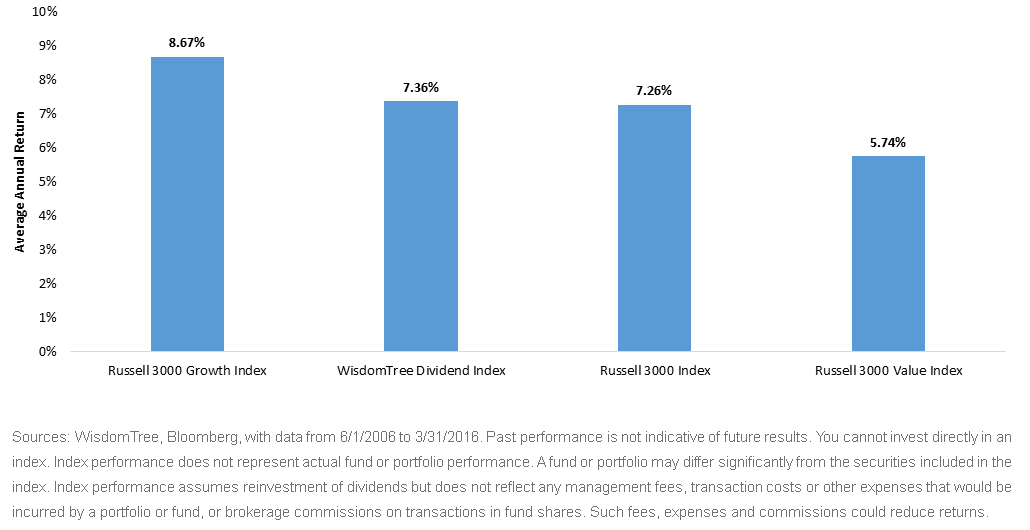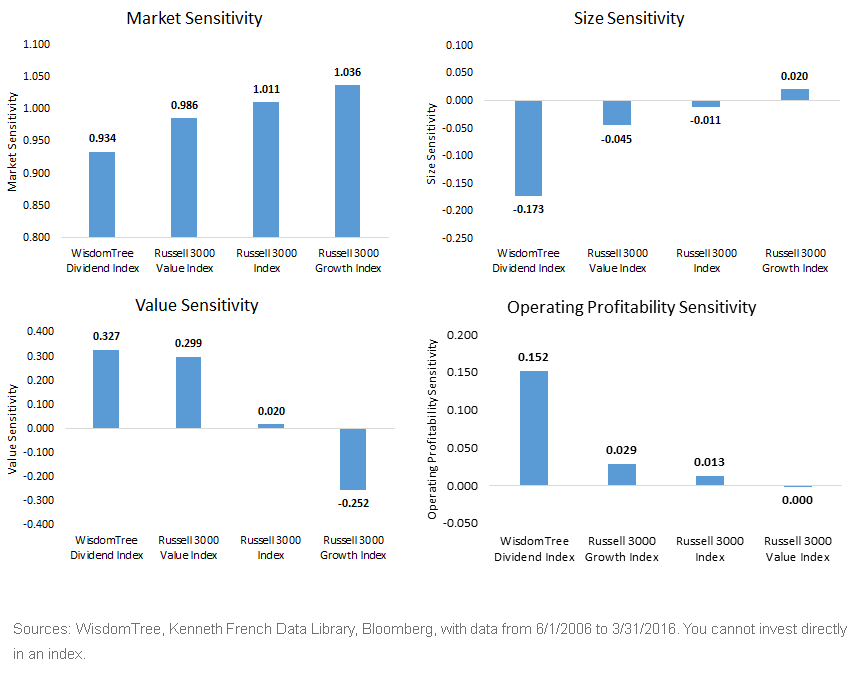What Is the Income Factor in U.S. Equities?


 • In a market where the growth style was in favor, the WisdomTree Dividend Index outperformed the Russell 3000 Index as well as the Russell 3000 Value Index. It should be noted that, due to the dividend focus, many initially think of the WisdomTree Dividend Index, with its focus on the U.S. income factor, as being “value in drag.” Clearly, there was something other than just value at play over this period.
• The Russell 3000 Index represents an important benchmark that is meant to be very broadly inclusive (i.e., not selective) within the U.S. equity market. The differences between this index and the WisdomTree Dividend Index can be viewed as tilts coming as a consequence of the income factor.
The Income Factor Mix: Market, Size, Value, Operating Profitability
• In a market where the growth style was in favor, the WisdomTree Dividend Index outperformed the Russell 3000 Index as well as the Russell 3000 Value Index. It should be noted that, due to the dividend focus, many initially think of the WisdomTree Dividend Index, with its focus on the U.S. income factor, as being “value in drag.” Clearly, there was something other than just value at play over this period.
• The Russell 3000 Index represents an important benchmark that is meant to be very broadly inclusive (i.e., not selective) within the U.S. equity market. The differences between this index and the WisdomTree Dividend Index can be viewed as tilts coming as a consequence of the income factor.
The Income Factor Mix: Market, Size, Value, Operating Profitability
 We can see that the income factor leads to the following tilts:
1. Lower Market Sensitivity: The interpretation here is that, in both upward- and downward-trending markets, the WisdomTree Dividend Index, with its focus on the income factor, would not be expected to capture the full movement in either direction. In some ways, one can think of this as a tilt toward “lower volatility,” at least compared to the market, where we see the Russell 3000 Index at 1.01.
2. Sensitivity to Large Stocks: What we see here is that there is no introduction of an important bias that many would attribute to smart beta strategies—a tilt toward small caps. The thinking is that, since it is known that small caps have greater risk but also greater return over time, this is one way to potentially outperform. However, the -0.173 shows that there is a significant tilt toward larger-capitalization stocks in the WisdomTree Dividend Index, as it focuses on the income factor.
3. Sensitivity to Value Style: We do see a tilt toward the value style, although not too much more than the Russell 3000 Value Index. It is true that most mid-cap and small-cap growth companies in the United States do not pay regular dividends, and therefore they would not find themselves included in the WisdomTree Dividend Index. This would be one of the more prominent tilts observed through a focus on the income factor in the United States.
4. Sensitivity to Profitable Companies: On the face of it, this makes sense: companies that are not profitable may not be able to make good on their regular cash dividend policies for long. Committing to regular dividends is one way to think about potential quality, in that U.S. companies will rarely initiate a regular dividend only to then discontinue it soon after—especially when they also have such options as special dividends or buybacks at their disposal. It is interesting to see this tilt, as well as remembering that in our prior blog post it was pointed out that operating profitability, especially in large caps, has performed well over the past 10 years. This could be one element of the discussion lending clarity to the statement that the income factor is more than simply value style by a different name.
We can see that the income factor leads to the following tilts:
1. Lower Market Sensitivity: The interpretation here is that, in both upward- and downward-trending markets, the WisdomTree Dividend Index, with its focus on the income factor, would not be expected to capture the full movement in either direction. In some ways, one can think of this as a tilt toward “lower volatility,” at least compared to the market, where we see the Russell 3000 Index at 1.01.
2. Sensitivity to Large Stocks: What we see here is that there is no introduction of an important bias that many would attribute to smart beta strategies—a tilt toward small caps. The thinking is that, since it is known that small caps have greater risk but also greater return over time, this is one way to potentially outperform. However, the -0.173 shows that there is a significant tilt toward larger-capitalization stocks in the WisdomTree Dividend Index, as it focuses on the income factor.
3. Sensitivity to Value Style: We do see a tilt toward the value style, although not too much more than the Russell 3000 Value Index. It is true that most mid-cap and small-cap growth companies in the United States do not pay regular dividends, and therefore they would not find themselves included in the WisdomTree Dividend Index. This would be one of the more prominent tilts observed through a focus on the income factor in the United States.
4. Sensitivity to Profitable Companies: On the face of it, this makes sense: companies that are not profitable may not be able to make good on their regular cash dividend policies for long. Committing to regular dividends is one way to think about potential quality, in that U.S. companies will rarely initiate a regular dividend only to then discontinue it soon after—especially when they also have such options as special dividends or buybacks at their disposal. It is interesting to see this tilt, as well as remembering that in our prior blog post it was pointed out that operating profitability, especially in large caps, has performed well over the past 10 years. This could be one element of the discussion lending clarity to the statement that the income factor is more than simply value style by a different name.
Important Risks Related to this Article
Dividends are not guaranteed, and a company currently paying dividends may cease paying dividends at any time.

Christopher Gannatti began at WisdomTree as a Research Analyst in December 2010, working directly with Jeremy Schwartz, CFA®, Director of Research. In January of 2014, he was promoted to Associate Director of Research where he was responsible to lead different groups of analysts and strategists within the broader Research team at WisdomTree. In February of 2018, Christopher was promoted to Head of Research, Europe, where he was based out of WisdomTree’s London office and was responsible for the full WisdomTree research effort within the European market, as well as supporting the UCITs platform globally. In November 2021, Christopher was promoted to Global Head of Research, now responsible for numerous communications on investment strategy globally, particularly in the thematic equity space. Christopher came to WisdomTree from Lord Abbett, where he worked for four and a half years as a Regional Consultant. He received his MBA in Quantitative Finance, Accounting, and Economics from NYU’s Stern School of Business in 2010, and he received his bachelor’s degree from Colgate University in Economics in 2006. Christopher is a holder of the Chartered Financial Analyst Designation.

